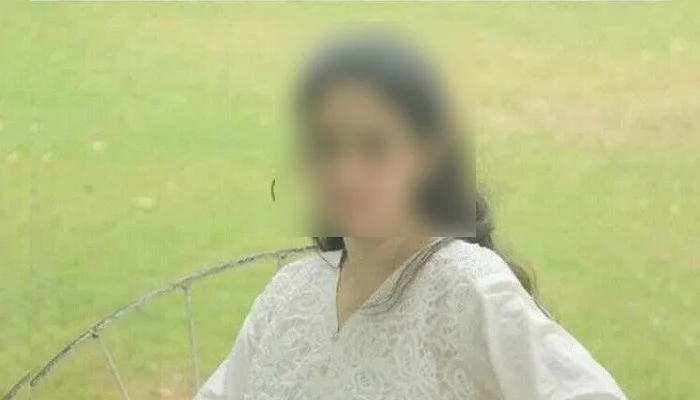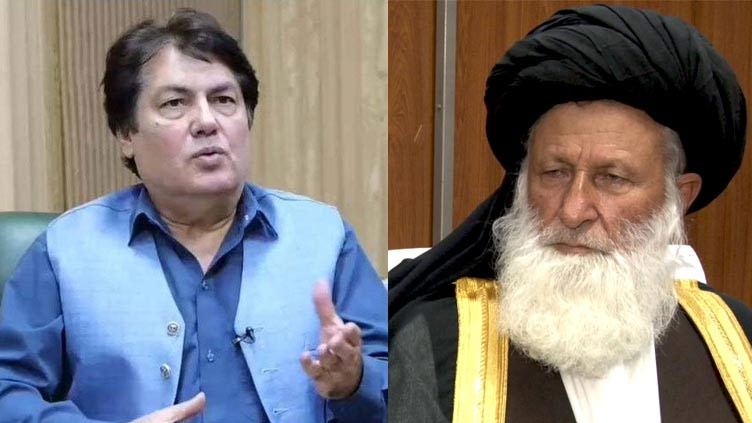- “There is no truth to reports of Dua’s recovery,” Lahore’s DIG operations says.
- CM Sindh says whereabouts of the girl traced, terms matter “sensitive”.
- Dua’s father insists daughter’s age is 14, not 18; girl went missing 10 days back.
KARACHI/LAHORE: The father of Dua Zehra — the girl who had gone missing from Karachi’s Al Falah area a week back — said Monday that the police have not yet confirmed whether she had been recovered or not.
“Additional Inspector-General (Ghulam Nabi Memon) did not confirm whether the police found Dua or not,” the missing 14-year-old girl’s father told Geo News.
Giving details of his telephonic contact with the police officer, he told Geo News that Additional IG Ghulam Nabi Memon asked him if the news airing on TV about Dua Zehra was authentic.
Kazmi said that he told the police officer that he did not know about her recovery and asked him to verify it as he was an official related to the government.
“A nikkah nama attributed to my daughter is circulating on the social media wherein her age is written as 18 years,” he said, insisting that his daughter is below 14.
Responding to a question, Kazmi said he did not recognise any of the names written in the nikah nama. “These all names are new for me,” he added.
Before her father’s confirmation, sources told Geo News that Lahore police informed their Karachi counterpart of Dua’s recovery, while the police of both the metropolia are in touch over the matter.
Karachi also police said that Dua tied the nuptial knot with a boy — who is a resident of Lahore. The marriage certificate of the teenager has been obtained by the police and is being verified.
But commenting on the reports of her recovery, Deputy Inspector-General (DIG) Operations Dr Abid Khan said Lahore police have shared the girl’s nikkah nama with their Karachi counterpart and are using the document to trace her.
“There is no truth to the reports of Dua’s recovery […] the real facts behind this matter can only be verified once the girl is in our custody,” the police official told journalists.
Dr Khan added that Lahore and Karachi police are in contact with each other, and assured the public that the police would find her soon.
Whereabouts traced: CM Sindh
In a press conference, Sindh Chief Minister Murad Ali Shah also said the whereabouts of the missing teen had been traced but did not provide further details as the matter was “sensitive”.
Following reports of her being traced, Sindh Women Development Minister Syeda Shehla Raza reached the girl’s house and told journalists that the AIG has not confirmed whether the girl has been recovered yet.
“Sindh police will make an official statement once the girl’s video statement is released […] IG has made it clear that the video statement is necessary for further probe,” Raza said.
The minister noted that despite reports claiming that the girl went to Lahore out of her own free will, she was a minor and cannot do so under the law.
“When the girl will record her statement in the court then the judiciary would ask her to reconsider the marriage till she turns 18. Once she is recovered [and after the necessary judicial matters are done] she will stay at the child protection bureau till she is 18 years old,” Raza said.
Raza added she saw the girl’s Child Registration Certificate (CRC) — also known as B-form — and in line with that, her marriage — if solemnised — would stand invalid as she is under 18.
Police teams formed; FIA joins in
To ensure the girl’s recovery, three separate police teams were formed to trace her last week, while the Federal Investigation Agency’s cybercrime cell also joined the probe.
A four-member FIA team visited Dua’s home on Friday and had said that the agency had taken the initiative of joining the case itself.
“No one approached us because it’s a police chase, but it’s our own decision to help the family and the police investigators for the early and safe recovery of the girl,” said cybercrime cell chief Imran Riaz.
On Thursday, Dua’s mother had said that if her daughter was not recovered, she and her family would commit suicide in front of the Governor House.
The case
The case of the mysterious disappearance of the teenage girl from Karachi’s Al-Falah shook everyone. She went missing from the Golden Town area 10 days ago, triggering a sense of fear among the masses.
Police conducted multiple raids but failed to recover the girl. The police had claimed that she might have left the house of her own choice but the family had rejected it.


 Latest News3 days ago
Latest News3 days ago
 Latest News3 days ago
Latest News3 days ago
 Latest News3 days ago
Latest News3 days ago
 Latest News3 days ago
Latest News3 days ago
 Latest News3 days ago
Latest News3 days ago
 Latest News3 days ago
Latest News3 days ago
 Latest News3 days ago
Latest News3 days ago
 Latest News3 days ago
Latest News3 days ago












